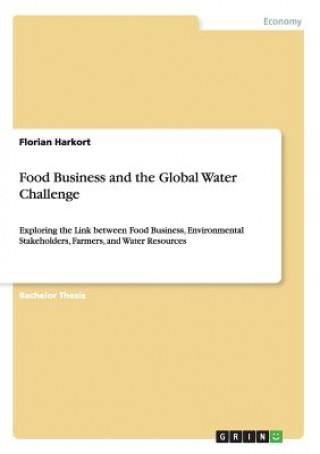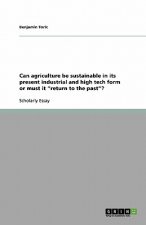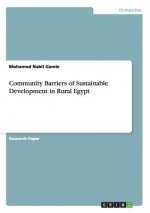
Kód: 01626291
Food Business and the Global Water Challenge
Autor Florian Harkort
Bachelor Thesis from the year 2008 in the subject Business economics - Business Ethics, Corporate Ethics, grade: 1,7, University of Hohenheim (Institut für Agrarpolitik und Landwirtschaftliche Marktlehre), course: Management in de ... celý popis
- Jazyk:
 Angličtina
Angličtina - Vazba: Brožovaná
- Počet stran: 68
Nakladatelství: Grin Verlag, 2010
- Více informací o knize

Mohlo by se vám také líbit
-

Can agriculture be sustainable in its present industrial and high tech form or must it return to the past?
434 Kč -

Community Barriers of Sustainable Development in Rural Egypt
1022 Kč -

Stalingrad
810 Kč -

Poems in Two Volumes
973 Kč -

Becoming Native to This Place
430 Kč -

Dumm und Dümmehr, 1 DVD
326 Kč -

Paper (04) Passion
341 Kč
Dárkový poukaz: Radost zaručena
- Darujte poukaz v libovolné hodnotě a my se postaráme o zbytek.
- Poukaz se vztahuje na celou naši nabídku.
- Elektronický poukaz vytisknete z e-mailu a můžete ihned darovat.
- Platnost poukazu je 12 měsíců od data vystavení.
Více informací o knize Food Business and the Global Water Challenge
Nákupem získáte 144 bodů
 Anotace knihy
Anotace knihy
Bachelor Thesis from the year 2008 in the subject Business economics - Business Ethics, Corporate Ethics, grade: 1,7, University of Hohenheim (Institut für Agrarpolitik und Landwirtschaftliche Marktlehre), course: Management in der Ernährungswirtschaft, language: English, abstract: In many ways water is of vital importance for humanity. But 1.1 billion people in developing countries today have inadequate access to water. While competition for water increases worldwide, agriculture the major user of water is challenged to manage water in a more efficient and environmentally sustainable way. Meanwhile, the governance of the global agri-food system is undergoing significant changes, thus altering business relationships. These altered business relationships raise questions about the impact of food business on water resources. The central research question of this paper, applied to developing countries, is: Does food business satisfy the interests of Environmental Special-Interest Groups and farmers in efficient and environmentally sustainable agricultural water management, as well as the interests in the related arrangements of relationships? Drawing on stakeholder theory, the relationships between food business, environmental stakeholders, farmers, and water resources are explored. By transferring the key principles of value creation, dialog, and continuous improvement on food business, critical factors were identified. Value creation, inclusiveness, and accountability are crucial features of relationships with environmental stakeholders, while value creation, fairness, support and compliance are crucial features of relationships with farmers. Two case studies, focusing on Nestlé and GlobalGAP, were undertaken. The study concludes that food business increasingly acknowledges the vital importance of addressing water management in agriculture. The case studies provided a few promising approaches to satisfy the interests of environmental stakeholders and farmers. Further research must be conducted, in order to assess the particular implications for smallholders. In addition, more transparency is generally needed, to make the effective impact of food business on water resources in global agriculture measurable.--Keywords: Water resources, irrigation, food industry, food trade, csr, corporate social responsibility, business ethics, green business, stakeholder dialogue, supply chain, procurement, stakeholder management / Schlagworte: Bewässerung, Nachhaltigkeit, Unternehmensethik, Wirtschaftsethik, Ethik, Verantwortung, Stakeholderansatz, Stakeholderdialog, Anspruchsgruppen, Lebensmittelindustrie, Nahrungsmittelindustrie, Lebensmitteleinzelhandel, Lebensmittelhandel, Handel, Konsumgüter, Supermarkt, Lieferkette, Beschaffung.
 Parametry knihy
Parametry knihy
Zařazení knihy Knihy v angličtině Society & social sciences Education Organization & management of education
1437 Kč
- Plný název: Food Business and the Global Water Challenge
- Podnázev: Exploring the Link between Food Business, Environmental Stakeholders, Farmers, and Water Resources
- Autor: Florian Harkort
- Jazyk:
 Angličtina
Angličtina - Vazba: Brožovaná
- Počet stran: 68
- EAN: 9783640459315
- ISBN: 3640459318
- ID: 01626291
- Nakladatelství: Grin Verlag
- Hmotnost: 104 g
- Rozměry: 210 × 148 × 5 mm
- Rok vydání: 2010
Oblíbené z jiného soudku
-

Basic Montessori
474 Kč -

Smartest Kids in the World
306 Kč -

First Little Readers Parent Pack: Guided Reading Level B
592 Kč -

First Little Readers: Guided Reading Level C (Parent Pack)
573 Kč -

Outcomes Intermediate: Workbook with CD
492 Kč -

Art of Coaching Teams - Building Resilient Communities that Transform Schools
754 Kč -

You, Your Child, and School
453 Kč -

Candlestick Charting For Beginners
330 Kč -

Teaching Mindfulness to Empower Adolescents
781 Kč -

How to Win at College
451 Kč -

Form Drawing and Colouring
410 Kč -

Visible Learning: Feedback
951 Kč -

How to Be Heard
399 Kč -

Kallis' TOEFL iBT Pattern Reading 1
543 Kč -

Whatever Happened to Margo?
276 Kč -

Pearson REVISE Edexcel GCSE Maths Foundation Guided Revision Workbook - 2023 and 2024 exams
231 Kč -

Search for a Theology of Childhood
967 Kč -

Pearson REVISE Edexcel GCSE (9-1) Combined Science Higher Guided Revision Workbook
378 Kč -

OCA/OCP Java SE 8 Programmer Certification Kit
1879 Kč -

Keynote Proficient with DVD-ROM
1048 Kč -

OET Writing Strategy Guide
477 Kč -

Official Guide to the GRE General Test, Third Edition
811 Kč -

F in Exams
230 Kč -

Cleverlands
357 Kč -

Responsive Teaching
603 Kč -

Ten Ways to Destroy the Imagination of Your Child
452 Kč -

Dr. Montessori's Own Handbook
356 Kč -

Inside the Black Box
208 Kč -

Pearson REVISE Edexcel GCSE English Language Guided Revision Workbook - 2023 and 2024 exams
231 Kč -

Lean Lesson Planning
554 Kč -

Innovative University
650 Kč -

Hundred Languages of Children
1309 Kč -

Summerhill and A S Neill
1085 Kč -

Concept-Based Curriculum and Instruction for the Thinking Classroom
1079 Kč -

On the Nature of the Psyche
441 Kč -

Pearson REVISE Edexcel GCSE Business Revision Workbook for the 2023 and 2024 exams
240 Kč -

Kallis' TOEFL iBT Pattern Speaking 1
523 Kč -

Mathematics Formative Assessment, Volume 2
1088 Kč -

Inquiry-Based Teaching and Learning across Disciplines
1960 Kč -

Forest School for All
1079 Kč -

Tasks and Content of the Steiner-Waldorf Curriculum
543 Kč -

Creating Significant Learning Experiences, Revised and Updated - An Integrated Approach to Designing College Courses
1058 Kč -

Media Education - Literacy, Learning and Comtemporary Culture
877 Kč -

Teaching of Science in Primary Schools
1230 Kč -

27 Ways to Increase Your Child's IQ
337 Kč -

Pearson REVISE Edexcel GCSE History Model Answer Workbook - 2023 and 2024 exams
253 Kč -

Pearson REVISE Edexcel A level Maths Revision Workbook
414 Kč -

Principal - Three Keys to Maximizing Impact
852 Kč -

Principal's Companion
1256 Kč
Osobní odběr Praha, Brno a 12903 dalších
Copyright ©2008-24 nejlevnejsi-knihy.cz Všechna práva vyhrazenaSoukromíCookies



 Vrácení do měsíce
Vrácení do měsíce 571 999 099 (8-15.30h)
571 999 099 (8-15.30h)